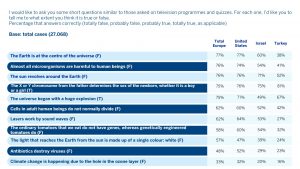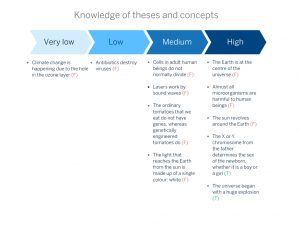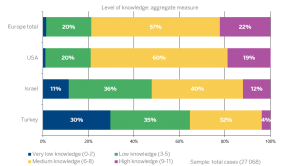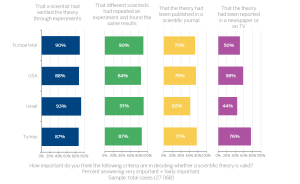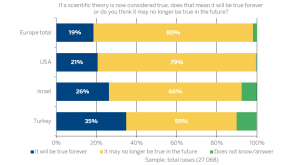
A majority of citizens in Europe, the United States, Turkey and Israel are familiar with basic scientific concepts and the processes of knowledge testing and validation
Scientific culture – values, attitudes and knowledge – is an intangible but essential component of advanced societies, with multiple ramifications in the public and private sphere. It provides citizens with the necessary tools to apprehend, evaluate and address the main goals and challenges they face. This body of knowledge forms a kind of mental GPS that serves to counteract the questioning of rationality and objectivity currently emanating from certain elites and vested interests. With this in mind, the BBVA Foundation has conducted an extensive empirical study of scientific culture in 15 European countries, including Denmark, France, Germany, Italy, the Netherlands, Portugal, Spain and the United Kingdom, and several countries of the former Eastern bloc – Bulgaria, the Czech Republic, Estonia, Hungary, Poland, Romania and Slovakia –, as well as three other societies with disparate profiles: Israel, Turkey and the United States.
13 May, 2024
The first installment of the study covered the attitudinal dimension, along with citizens’ overall perception of science-related values and the trust they place in science and the scientific community. Its main conclusion was that a majority of European, American, Israeli and Turkish citizens view science as the most reliable, objective and truthful source of knowledge. The second installment, which is presented here, zooms in on another essential pillar of a country’s scientific culture, the cognitive dimension or level of scientific knowledge held by its citizens, as gleaned from three facets: understanding of basic scientific concepts and notions; the principles of the scientific method and experimental testing; and the institutional mechanisms for the verification and acceptance of research as validated public knowledge through the processes of peer review and publication in scientific journals.
Medium-level knowledge of elementary concepts in physics and biology
To measure the public’s knowledge of science in the societies analyzed, respondents were tested on a list of 11 basic concepts.
The results of the study show that certain fundamental notions are known and understood by the majority of citizens: the fact that the Sun does not revolve around the Earth (76% in Europe as a whole and the United States, 71% in Israel and 52% in Turkey), and that the universe began with the huge explosion of the Big Bang (75% in Europe, 71% in the United States, 67% in Turkey and 49% in Israel). Other concepts understood by a significant portion of the population of survey countries include the fact that the father’s X or Y chromosome is what determines the sex of a newborn (75% in Europe, 76% in the United States, 75% in Israel and 81% in Turkey) and that cells divide (62% in Europe, 60% in the United States, 52% in Israel and 42% in Turkey).
Where knowledge is more lacking is in regard to notions like the function of antibiotics (only 52% of American citizens, 48% of Europeans, 29% of Israelis and 23% of Turks respond correctly that “they do not destroy viruses”). One striking detail is the low knowledge scores of most respondents with regard to two subjects featuring prominently and recurrently in the media and public debate: genetics (around 40% of Europeans and Americans, 30% of Israelis and 55% of Turks believe that “the ordinary tomatoes that we eat do not have genes, whereas genetically engineered tomatoes do”), and, notably, the causes of climate change (only a third of Europeans and Americans, 20% of Israelis and 16% of Turks mark as false the idea that it is happening “due to the hole in the ozone layer”).
Knowledge levels and sociodemographic factors
Grouping the test results into four knowledge segments labeled “high” (9 to 11 correct answers), “medium” (6 to 8), “low” (3 to 5) and “very low” (0 to 2), we find European societies and the United States to be relatively homogeneous as regards the cognitive facet of scientific culture, with the medium segment predominating (57% in Europe and 60% in the United States). There are no significant differences between men and women, and only weak differences in the overall results of the 11-item test according to years of formal education, suggesting that a basic scientific culture is part of the ecosystem of these societies, to which various sources and agents contribute, including the media and the scientific community itself. If we zero in on the most difficult items, like those dealing with genetics, marked differences emerge as a function of educational level and news media consumption.
In the remaining survey countries, Israel and Turkey, the public’s scientific culture presents a more stratified profile, linked to level of formal education. Compared to Europe and the United States, these two societies display marked inequalities: the medium knowledge segment accounts for just 40% in Israel and 32% in Turkey, with the low or very low knowledge segments summing 48% and 65% respectively, and the high knowledge segment coming in at just 12% and 4%. In both cases we find pronounced differences by educational level: while at the primary education stage the two countries register large majorities (70%) in the low-very low knowledge band, among those with tertiary studies 66% in Israel and 47% in Turkey stand in the medium or high knowledge segments.
[For more information on knowledge level by sociodemographic segment, see slide 1 of the Appendix]
Understanding of the scientific method and process of knowledge validation
Another part of the cognitive side of a society’s scientific culture is an understanding of how science operates, particularly its systems of testing and validation. In this regard, large majorities in all survey countries are familiar with the process of scientific knowledge validation, attaching most importance to the empirical testing of theories through experiments and to the results of such experiments being reproducible by other scientists (over 85% in both cases).
At the same time, a large majority in all societies understand that research findings are transformed into public knowledge, validated by the scientific community, on being published in specialist scientific journals, and – at a considerable distance – when they are reported on in the general interest media.
The majority also grasp a fundamental aspect of scientific knowledge: the fact that the truth of scientific theories is not immutable, but may be questioned and overtaken as new advances appear (80% in Europe, 79% in United States, 66% in Israel and 55% in Turkey).
Familiarity with the great scientists of the past
Although science is a collective enterprise, the result of highly diverse, widely shared and accredited contributions, it also has central figures who have played a fundamental role in creating boundary-shifting paradigms or theories. When asked about “the most important scientists in world history,” citizens in most survey countries settled on two major names, both from the field of physics: Albert Einstein and, at a distance, Isaac Newton.
Einstein places first in almost every country, with mentions highest in Israel and Germany (61% in both cases) and lowest in Hungary (33%) and Turkey (32%). A long way behind come names like Isaac Newton (more frequently mentioned in the United States and Israel than in Europe, with the exception of the United Kingdom), Marie Curie (more in Europe), Thomas Alva Edison or Nikola Tesla.
As a rule, eminent national figures attract a sizeable share of mentions in their respective countries: Louis Pasteur and Marie Curie in France (36% and 33%), Isaac Newton, Charles Darwin and Stephen Hawking in the United Kingdom (33%, 19% and 16%), Galileo Galilei in Italy (25%) and Albert Szent-Györgyi in Hungary (32%). In Denmark, Niels Bohr, with 49% of mentions, even comes in ahead of Einstein.
Considering the impact and development of genetics in these past decades, a striking absence is that of the two great pioneers of the discipline, the co-discoverers of DNA, Francis Crick and James Watson, neither of whom appear among the scientists with a significant number of mentions in the 18 countries analyzed.
[For more information on spontaneous mentions of scientists per country, see slides 2-4 of the Appendix]
Technical notes
- Geographical scope of the study: Bulgaria, Czech Republic, Denmark, Estonia, France, Germany, Hungary, Italy, Netherlands, Poland, Portugal, Romania, Slovakia, Spain, United Kingdom, United States, Israel and Turkey.
- Universe: in each country, the general population aged 18 and over.
- Method: computer-assisted telephone survey and, in Turkey and Israel, personal survey.
- Sample size and distribution: 1,500 cases per country. Multistage sample distribution stratified by region (NUTS classification or equivalent)/size of habitat, with primary units selected at random at municipality level and selection of individuals according to sex and age quotas.
- Sampling error: the estimated sampling error is +/- 2.6% for each country for a 95% confidence level and in the worst case scenario (p=q=0.5).
- Fieldwork was carried out between April and July, 2023.
- Weighting: for the results of the European countries surveyed, the data for each country have been weighted according to the population weight of each in the universe of European countries included.
- The fieldwork was coordinated and conducted by KANTAR PUBLIC (currently Verian) with registered address in Madrid, Calle Poeta Maragall, 23.
- The design of the questionnaire and data analysis were the work of the BBVA Foundation Department of Social and Public Opinion Studies.

